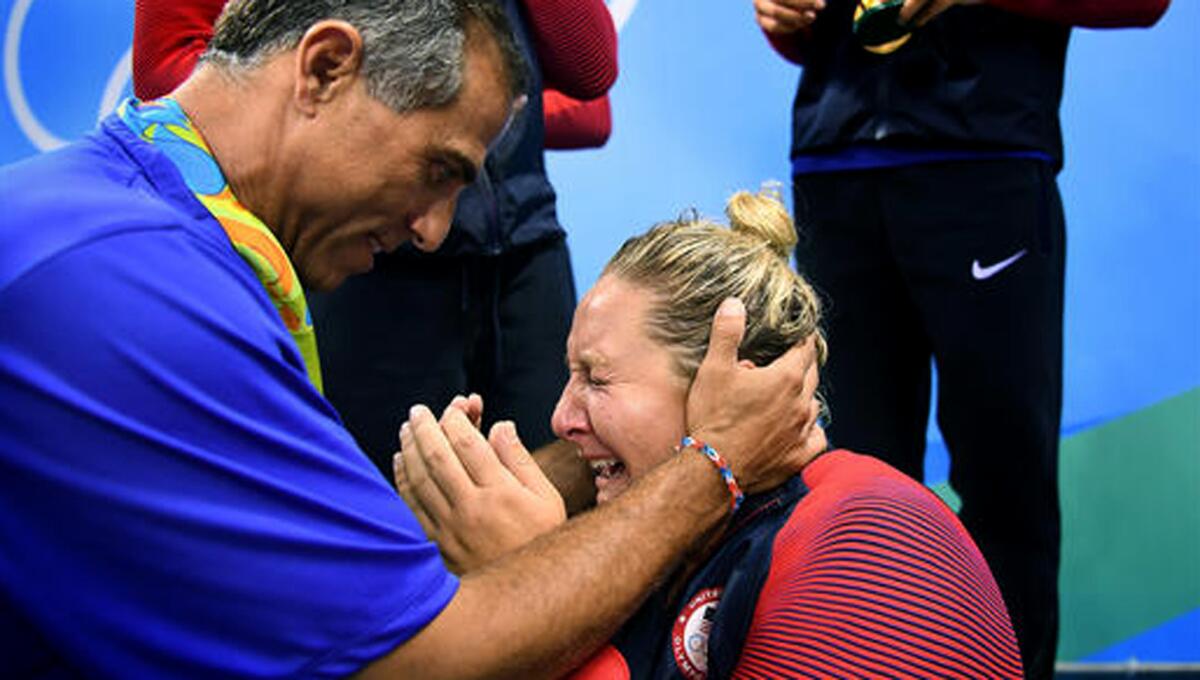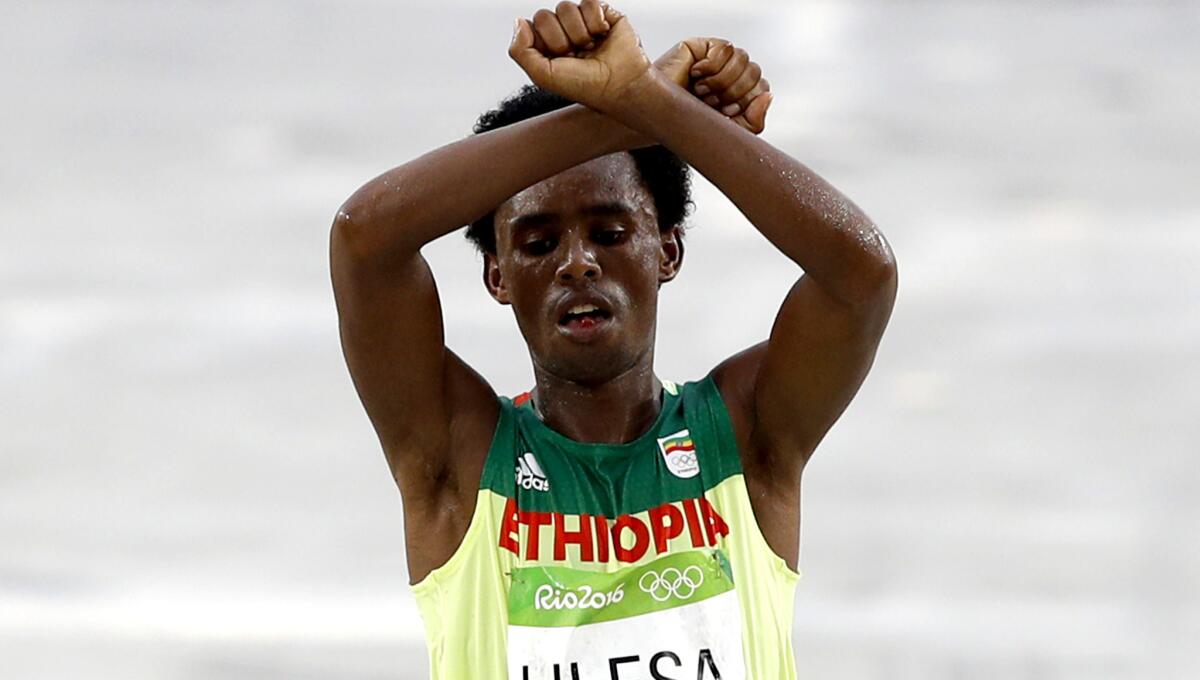Memories of the Rio Olympics stay with those who reported on it

- Share via
Reporting from Rio de Janeiro — My medal platform of memories is filled by two people and a team that not only successfully defended their titles, but made history doing it.
The bronze goes to judoka Kayla Harrison, who become the first American to win two gold medals in her sport. The silver goes to middleweight boxer Claressa Shields, the first American — male or female — to win two Olympic boxing titles. And the gold goes to the women’s water polo team, which not only became the first repeat champion in the history of its sport, but did it with a heavy heart after the brother of Coach Adam Krikorian died of a heart attack two days before the Games began.
Despite the grief, Krikorian insisted on coaching in Rio, and after the team beat Italy in the final, his players lined up on the side of the pool and, one by one, draped their goal medals around his neck.
— Kevin Baxter
These Games reminded me how important experience and luck can be when talking to the world. When the story about Ryan Lochte being robbed at gunpoint was first tweeted out by an Australian journalist, my initial instinct was how would he know? Seems he happened to be on a bus with Lochte’s mom and she told him.
Instinct kicked in when we started to learn facts. They didn’t add up. Yet misinformation flowed in social media, although some got it right. Final bit of reality was when the USOC statement started with: “According to four members of the U.S. Olympic Swimming Team … ” Bingo, that meant the USOC had doubts.
What played out was equal parts sad, maddening and infuriating, yet, as a journalist it gets your adrenaline pumping and your brain working overtime. As the expression goes, “If your mom tells you she loves you, check it out.” We, and many other U.S. journalists, did just that. Getting it right is always a nice memory.
— John Cherwa

And so, my Olympic memory was all but done — merely needed a way to neatly wrap up my ode to Helen Maroulis, who made history by winning the first-ever gold medal for U.S. women’s wrestling. But then came the marathon. That’s when silver medalist Feyisa Lilesa, approaching the finish line, put his hands over his head and crossed his wrists.
The 26-year-old explained that the gesture was in solidarity with the resistance movement back in his homeland of Ethiopia, adding it was for his family members who were jailed for protests against the government. Several questions later, he calmly and directly answered questions about the consequences for him back home following this public protest.
Lilesa said “Maybe they kill me … maybe they put me in prison.” This was my sixth Summer Olympics and I am at a loss to remember such a courageous action.
— Lisa Dillman
Character is best observed not in victory, but in defeat. To see American runner Abbey D’Agostino and New Zealand rival Nikki Hamblin help each other up after they had collided and fallen during the first round of the 5,000-meter race was to be reminded that winners don’t always finish first, that how you compete is as important as how fast you run or how high you jump.
The same for Allyson Felix, whose hope of repeating as the Olympic 200-meter champion was crushed when an ankle injury prevented her from winning an Olympic berth at that distance. She made the U.S. team in the 400 on pure grit, only to lose a gold medal when Shaunae Miller of the Bahamas made a desperate dive at the finish line. Felix’s expression conveyed her devastation better than any words could have, but her dignity never wavered.
In that, she was like figure skater Michelle Kwan, who is remembered as a champion even though she never won an Olympic gold medal. Felix has won six gold medals and nine overall, and I’ve been fortunate enough to see most of those races. Her smile in anchoring relay wins in those last two races spoke of a long and often difficult journey that she traversed with pure class.
— Helene Elliott
For all the troubles surrounding these Games — forced evictions, financial woes, half-full arenas, logistical problems and security lapses — the beach volleyball venue on Copacabana felt like the place where the whole haphazard production came together to produce something unforgettable. Sure, the temporary bleachers buckled and swayed enough to make you question the structure’s soundness each time Brazilian supporters jumped up and down to celebrate a point in their country’s semifinal last week against Americans Kerri Walsh Jennings and April Ross. But there wasn’t an empty seat, even though the match started past midnight.
A live band jammed. The Brazilians, as enthusiastic fans as you’ll ever encounter, chanted “Monster block!” and waved their arms. They jeered each serve by the Americans. The noise and movement never stopped. It felt like a party, miles away from the drab collection of venues in the sprawling suburb that houses Olympic Park. As waves crashed in the background and heavy salt air drifted through the stadium well past 1 a.m., you could set aside the conflicted nature of these Games and simply enjoy the moment.
— Nathan Fenno

Every Olympics there is one moment so intense and explosive that it sears itself into your soul. There are a few that occupy that space in my head: Michael Phelps winning by a fingertip in Beijing, Sid the Kid scoring an overtime goal to beat the U.S. In Vancouver. Then last night happened. With 80,000 hopeful souls pushing the Brazil men’s football team along. Neymar puts in the final penalty kick to seal a win over Germany and the absolute loudest, most sustained noise I’ve ever heard rattled my bones to the marrow. It felt as if all of Brazil was screaming and weeping and exhaling all at the same time. Welcome to my soul, Brazil.
— Robert Gauthier
A Rio media cafeteria that featured long lines and few choices had one saving grace — the contemporary pop and dance music that would fill the air around the cash registers. Grumbles would turn to smiles. The endless waiting suddenly didn’t seem so long.
It turns out, this world’s media was being entertained by a sound system that some kid apparently carted in from his bedroom, which was a perfect symbol for what can be remembered as the Homemade Olympics. Brazil didn’t have the money or manpower to host these Games, but they proudly tried to make it work with tape and glue and prayers.
The Homemade Olympics were frustrating, but they were sincere, and even though even some medals podiums seemed warped and splintered, the Brazilian people deserve to stand atop those podiums for their effort.
— Bill Plaschke
The thing I like most about the Olympics is getting excited over sports I might not otherwise watch. The Games in Rio were no exception. The skeet competition in Deodoro was an unexpected nail-biter once you realized these shooters were so good that even one miss could make a difference. Kim Rhode needed four rounds of a tense shoot-off to win bronze and become the first Summer Olympian to medal at six consecutive Games dating back to 1996. That’s pretty amazing.
At the velodrome, I noticed an odd race in which a guy on a scooter led the pack at relatively low speed for almost five laps. The keirin seemed boring until the scooter, or “derny,” pulled off and all hell broke loose with the cyclists sprinting and bumping the final two laps.
The day before golf made its return to the Games after more than 100 years away, I walked the course at Marapendi nature preserve. Beside the third green was a large water hazard bordered by a strip of sand. A capybara slept there.The world’s largest rodent, a capybara is basically a 100-pound hamster. I watched it doze in the sun and was overcome by a sense that this was a very different part of the world.
That might be my favorite memory of the Games.
— David Wharton
More to Read
Go beyond the scoreboard
Get the latest on L.A.'s teams in the daily Sports Report newsletter.
You may occasionally receive promotional content from the Los Angeles Times.






